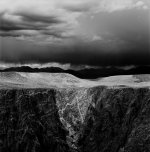R
Roberto
Guest
My totally baseless predictions:
* E-6 will die of attrition.
* C-41 emulsions will drop off one by one
* The motion picture industry will experience a radical shift in favor of digital. After a few years of rapidly shrinking revenue in that market, the existing still photo market won't be able to pick up the slack.
* Kodak & Fuji then get out of film entirely. Color first, then B&W.
* Ilford/Harman becomes the big dog on the block. Other than introducing Delta 25, don't expect anything more than incremental improvements in existing emulsions, or existing emulsions being offered in formats not currently available.
* Other boutique film manufacturers thrive in a niche market no longer dominated by Kodak & Fuji. There will be a huge bump in their figures once Tri-X is gone.
Perfectly said! 🙂
This is the more important point, ususally overlooked:
* The motion picture industry will experience a radical shift in favor of digital. After a few years of rapidly shrinking revenue in that market, the existing still photo market won't be able to pick up the slack.


